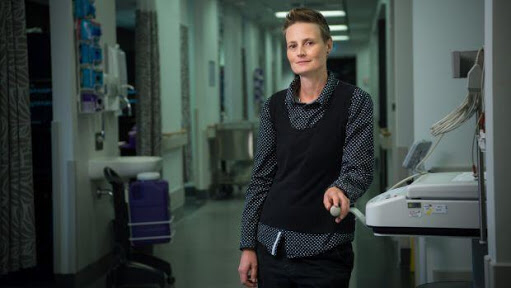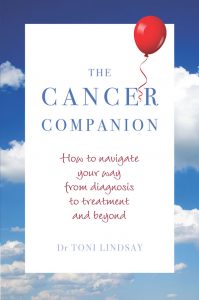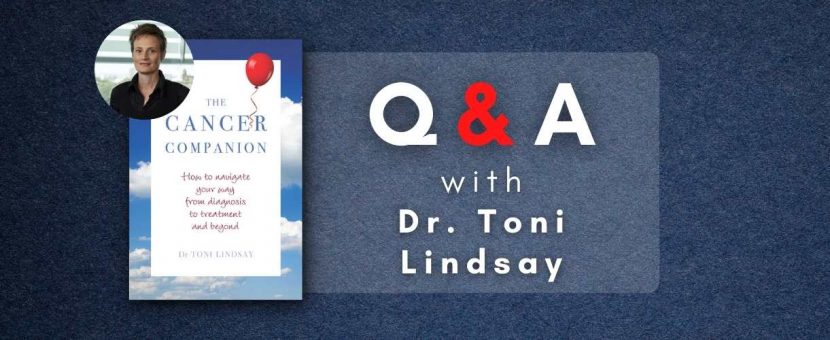
Dr Toni Lindsay is a qualified Clinical and Health Psychologist who has been working with both adults and adolescents for over 10 years. She works at Chris O’Brien Lifehouse in the Oncology and Haematology departments, and has a special interest in the care of Adolescents and Young Adults with cancer.
What inspired you to write this book?
When I saw patients and their carers they would often ask me for a resource which explores some of the things that we talk about in session, but I could never find anything that was a good fit.
I am also very conscious of the fact that while we know that there are very high levels of distress in the cancer population, only a small number of those diagnosed with cancer find their way to a psychologist or counsellor.
Why might some tried-and-true self-help books be unhelpful for cancer patients?
“The way of approaching these [cancer related anxieties] can sometimes look very different to if you were experiencing similar symptoms in other areas of life.”
Cancer is a bit of a tricky area – although most people diagnosed with cancer, and their families, will experience some anxiety or other psychological symptoms at some stage during their cancer journey.
For many people I meet, they have tried to find information that meets their needs, but most will describe difficulties around striking the balance between hopefulness and support and advice giving and quite concrete strategies.
There are many books which address things like diet and lifestyle for cancer patients, and for some people these can be really helpful, but I have never been able to find a book focused on the emotions or psychology of cancer, which also has a really honest approach to managing how tough it can be at times.

“I wanted to provide some support and guidance for people who might not necessarily connect with professional support, but would still benefit from some reassurance and strategies to help them navigate through.”
Why should carers be reading this book?
When someone is diagnosed with cancer, much of the focus becomes about them very quickly, however, we know that for many carers and family members they struggle with the same things, and sometimes even more so.
Many carers are just a step removed from the process – it isn’t happening in their body, and they feel powerless to be able to do things that will feel helpful for the person that they are caring for.
In addition to this though, there is a huge emotional cost of caring – it is a tough job and even though most people I meet do it unquestionably – having some strategies to help manage the impact of the carer role can be really important.
The book may also allow a shift in perspective – for both the patients and the carers to understand where each other is coming from, and perhaps allow conversations which make life a bit easier.
You’re currently working at Chris O’Brien’s Life House as a Clinical Psychologist, how do you think this book will help clinicians and those working with patients?
Much of what happens in therapy happens behind closed doors – it is very hard to get an insight into the ways in which working with patients and their families in this way plays out.
Many of the colleagues that I work with often comment on wanting to have a better understanding of the things that patients are experiencing emotionally, but also in wanting to be able to support them better.
It will also help clinicians identify the early warning signs for when people might need additional support, and how to engage in conversations around expected psychological impacts and when they are noticing that a patient is struggling.
“The Cancer Companion will help clinicians communicate with their patients about these tricky emotions in a consistent and supportive way.”
You mention in the book that all of the unknowns have the biggest impact on patient mental health. What piece of advice could give to any readers who are also struggling with the unknown?
Uncertainty and cancer often go hand in hand – and yet for many it can be the most difficult emotion to manage.
It can underpin many of the other presenting concerns that people have, particularly in relation to anxiety, so getting a good understanding of how uncertainty is showing up for people is really important.
I think that one of the most important things that can help in managing anxiety is acknowledging its presence.
It sounds a bit simple, but many people experience the impact of uncertainty – for instance anxiety turning up just before scans –without necessarily realising that it is the uncertainty of the future that is the driver below that.
Giving that uncertainty a name, recognising its presence, and knowing that it will turn up, means that you can then think about what you want to do with it.
You can choose to notice it, and then make a decision to stay in bed, or you could continue out into the world while carrying it with you.
“This doesn’t get rid of the uncertainty – that isn’t the goal – but it is about living your life when the uncertainty turns up.”

GET YOUR COPY TODAY
A cancer diagnosis can cause a torrent of unfamiliar emotions felt by both the patient and those who care for them.
The Cancer Companion is a compassionate, down-to-earth guide for those navigating these difficult and complex emotions. Its simple structure and comprehensive approach turns modern psychological research into constructive strategies for dealing with anxiety, depression, sleep disturbance, management of relationships, and many more components of cancer-related distress.
AUD $21.99 Tax IncludedAdd to cart

